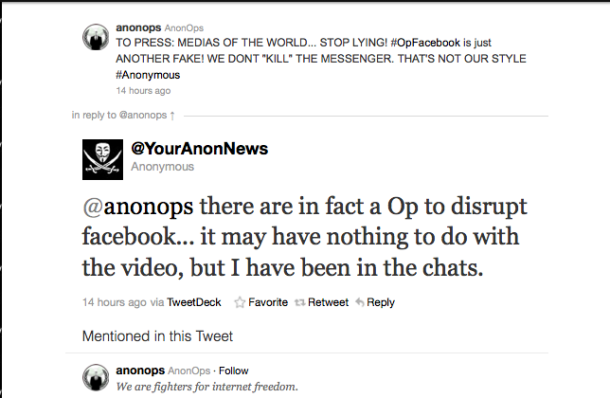The video that has caused so much wringing of fingers actually emerged onto YouTube July 16. The lone post of someone with the handle “FacebookOp,” it only began asserting itself in the last 24 hours. Some speculate it might be the work of a fractional faction of the hacktivist group.
Others wonder whether Google+ might be partly to blame. Google’s social network removed Anonymous from its exclusive pages, which led the group to announce its own social network.
Anonymous’ Twitter feed has declared that no one person can speak for the group. It has also said that the threat to “kill” Facebook on November 5 is fake.
One Twitter post read: “TO PRESS: MEDIAS OF THE WORLD…STOP LYING! #OpFacebook is just ANOTHER FAKE! WE DONT “KILL” THE MESSENGER. THAT’S NOT OUR STYLE #Anonymous
However one poster to that feed disagrees, offering: “@anonops there are in fact a Op to disrupt facebook…it may have nothing to do with the video, but I have been in the chats.”

Another poster declares: “#OpFacebook is being organised by some Anons. This does not necessarily mean that all of #Anonymous agrees with it.”
One question that might be worth asking is: how does Facebook feel about this?
It’s an important question as, in my experience, Facebook is an extremely responsive company. Messages are always swiftly returned, even if there is sometimes a touching reluctance to actually say anything that might be termed tangible.
Yet this threat has made Facebook come over all Cistercian. It has yet to return my requests for comment on the matter.
Some might wonder whether Facebook is looking at all this and angsting at its core. The company is well known for wanting to push the boundaries of what quaint people might call privacy. You might find it amusing that, for example, when you go to “Edit Friends” on your Facebook page, all of their phone numbers are now neatly printed beneath their pictures.
The more information that is on Facebook, the more business Facebook can make with it. But in order to encourage you to offer more information, the company has to make you feel that it is like the world in which they shoot fabric softener commercials–so secure that you will happily post your innermost feelings and outermost likes.
If, somehow, one or more Anonymous hackers decided to start publishing Facebook passwords and perhaps more, it just might effect Facebook’s veneer of comfort and Facebookers’ keenness to post their latest camping pictures.
Regardless of whether this is a fake threat, a rogue threat or a full-bore one, is Facebook scared? It surely has some reason to be.
 Follow
Follow